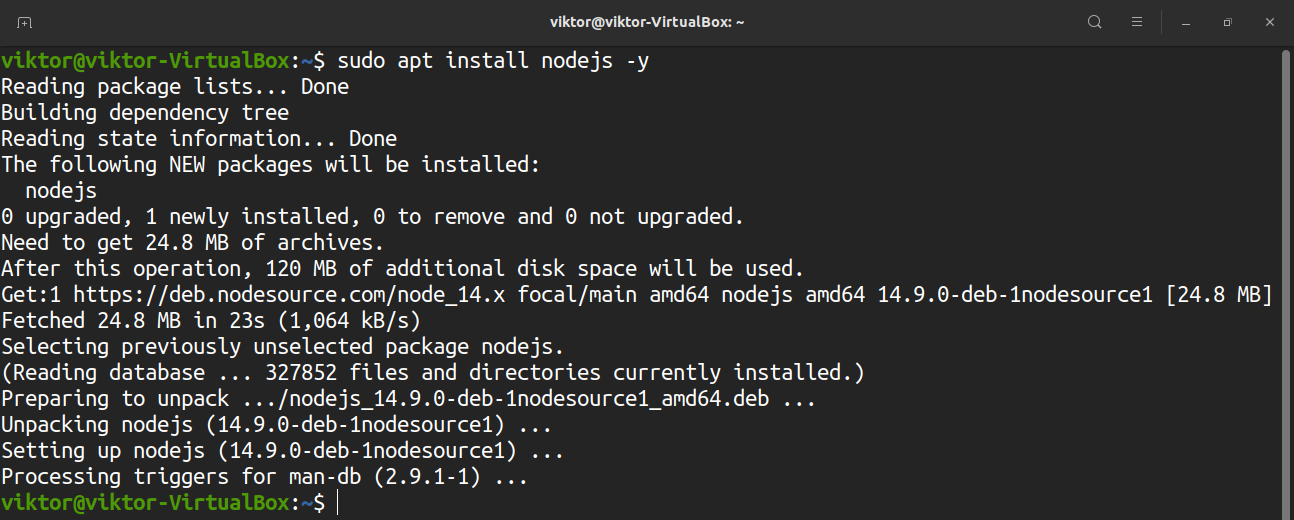

- #INSTALL NODE JS NVM UBUNTU HOW TO#
- #INSTALL NODE JS NVM UBUNTU INSTALL#
- #INSTALL NODE JS NVM UBUNTU UPDATE#
- #INSTALL NODE JS NVM UBUNTU SOFTWARE#
- #INSTALL NODE JS NVM UBUNTU DOWNLOAD#

The cookie is set by GDPR cookie consent to record the user consent for the cookies in the category "Functional". The cookie is used to store the user consent for the cookies in the category "Analytics". These cookies ensure basic functionalities and security features of the website, anonymously. Necessary cookies are absolutely essential for the website to function properly.
#INSTALL NODE JS NVM UBUNTU HOW TO#
You may also be interested in this article about How To Install Node.js on Centos 7. ConclusionĪt this point, you learn to Install Node.js on Ubuntu 22.04. You can always activate the system-installed version of Node using nvm use system. Note: if you also have a version of Node.js installed through apt, you may see a system entry here. Now you can see the different versions you have installed with the following command: nvm list Output To get the Node.js v16.14.0 (Latest LTS: Gallium) you can run the command below on Ubuntu 22.04: nvm install v16.14.0 To check the which versions of Node are available, run the following command: nvm list-remote Output When you are satisfied, run the command again with | bash appended at the end. Take a look and make sure you are comfortable with the changes it is making. Then, run the command without the | bash segment at the end of the command: curl -o.
#INSTALL NODE JS NVM UBUNTU SOFTWARE#
This piece of software allows you to install and maintain many different independent versions of Node.js, and their associated Node packages, at the same time.įirst, you need to visit the GitHub Project page and copy the curl command from the README file that displays on the main page. Install Node.js using the NVM (Node Version Manager)Īnother way of installing Node.js that is particularly flexible is to use nvm, the Node Version Manager.

Note: The NodeSource nodejs package contains both the node binary and npm, so you don’t need to install npm separately. Verify your Node.js installation on Ubuntu 22.04 with the command below: node -v Output You can now install the Node.js package in the same way you did in the previous section. The PPA will be added to your configuration and your local package cache will be updated automatically.
#INSTALL NODE JS NVM UBUNTU DOWNLOAD#
When your download is completed, run your installation script: sudo bash nodesource_setup.sh To download the installation script for your preferred version, you can use the curl command: # cd ~ Node.js v14, v16, and v17 are available as of the time of writing. These PPAs have more versions of Node.js available than the official Ubuntu repositories. To install a different version of Node.js, you can use a PPA (personal package archive) maintained by NodeSource. Now you can verify your Node.js installation by checking its version: node -v OutputĪlso, you can install the npm (Node.js Package Manager) with the following command: sudo apt install npm Install Node.js with the PPA repository Then, install Node.js on Ubuntu 22.04 with the command below: sudo apt install nodejs
#INSTALL NODE JS NVM UBUNTU UPDATE#
Install Node.js using the APT repository on Ubuntu 22.04įirst, update your local package index with the following command: sudo apt update

Now follow the steps below to install Node.js on your server. To do this, you can follow our article the Initial Server Setup with Ubuntu 22.04.


 0 kommentar(er)
0 kommentar(er)
